Corporate Social Responsibility as a Profit Tool in UK Businesses
VerifiedAdded on 2023/06/18
|8
|3159
|410
Report
AI Summary
This report analyzes the relationship between Corporate Social Responsibility (CSR) and profit-making in businesses, particularly within the UK context. It identifies various CSR practices that businesses can implement and explores the concept of CSR as a tool for maximizing profits. The research utilizes quantitative data collected through questionnaires from 80 respondents, employing simple random sampling. The study design is quantitative, focusing on descriptive statistics and SPSS analysis to define the relationship between CSR, customer retention, satisfaction, and purchase behavior. It addresses research questions on whether businesses should undertake CSR programs and if CSR serves as a profit-making tool, connecting CSR theories to demonstrate how consumer behavior can be positively influenced by socially responsible business practices. The report acknowledges limitations such as time and budget constraints, potential sample selection challenges, and the evolving nature of CSR in response to social needs, while aiming to provide insights for SMEs, entrepreneurs, and future researchers.
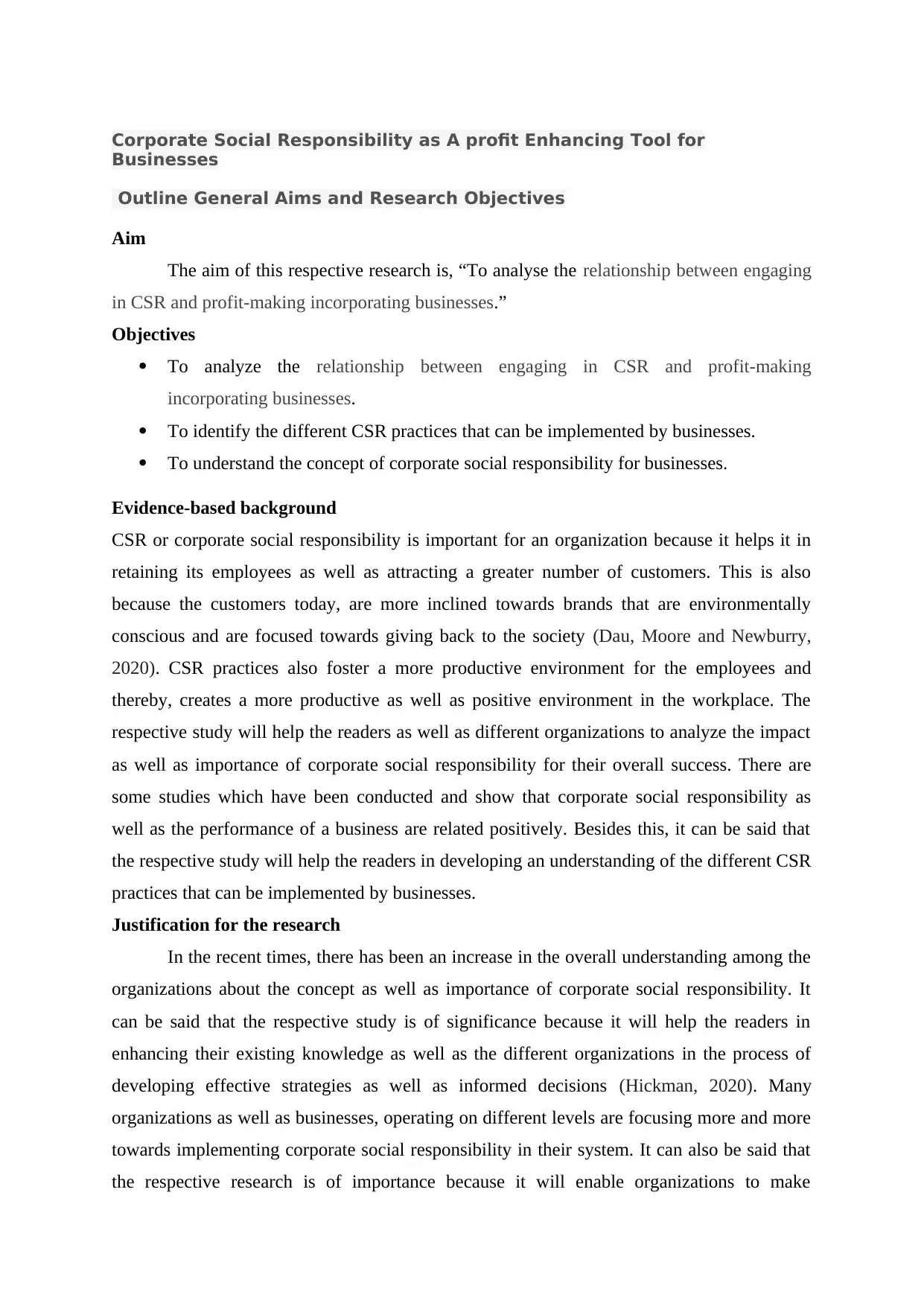
Corporate Social Responsibility as A profit Enhancing Tool for
Businesses
Outline General Aims and Research Objectives
Aim
The aim of this respective research is, “To analyse the relationship between engaging
in CSR and profit-making incorporating businesses.”
Objectives
To analyze the relationship between engaging in CSR and profit-making
incorporating businesses.
To identify the different CSR practices that can be implemented by businesses.
To understand the concept of corporate social responsibility for businesses.
Evidence-based background
CSR or corporate social responsibility is important for an organization because it helps it in
retaining its employees as well as attracting a greater number of customers. This is also
because the customers today, are more inclined towards brands that are environmentally
conscious and are focused towards giving back to the society (Dau, Moore and Newburry,
2020). CSR practices also foster a more productive environment for the employees and
thereby, creates a more productive as well as positive environment in the workplace. The
respective study will help the readers as well as different organizations to analyze the impact
as well as importance of corporate social responsibility for their overall success. There are
some studies which have been conducted and show that corporate social responsibility as
well as the performance of a business are related positively. Besides this, it can be said that
the respective study will help the readers in developing an understanding of the different CSR
practices that can be implemented by businesses.
Justification for the research
In the recent times, there has been an increase in the overall understanding among the
organizations about the concept as well as importance of corporate social responsibility. It
can be said that the respective study is of significance because it will help the readers in
enhancing their existing knowledge as well as the different organizations in the process of
developing effective strategies as well as informed decisions (Hickman, 2020). Many
organizations as well as businesses, operating on different levels are focusing more and more
towards implementing corporate social responsibility in their system. It can also be said that
the respective research is of importance because it will enable organizations to make
Businesses
Outline General Aims and Research Objectives
Aim
The aim of this respective research is, “To analyse the relationship between engaging
in CSR and profit-making incorporating businesses.”
Objectives
To analyze the relationship between engaging in CSR and profit-making
incorporating businesses.
To identify the different CSR practices that can be implemented by businesses.
To understand the concept of corporate social responsibility for businesses.
Evidence-based background
CSR or corporate social responsibility is important for an organization because it helps it in
retaining its employees as well as attracting a greater number of customers. This is also
because the customers today, are more inclined towards brands that are environmentally
conscious and are focused towards giving back to the society (Dau, Moore and Newburry,
2020). CSR practices also foster a more productive environment for the employees and
thereby, creates a more productive as well as positive environment in the workplace. The
respective study will help the readers as well as different organizations to analyze the impact
as well as importance of corporate social responsibility for their overall success. There are
some studies which have been conducted and show that corporate social responsibility as
well as the performance of a business are related positively. Besides this, it can be said that
the respective study will help the readers in developing an understanding of the different CSR
practices that can be implemented by businesses.
Justification for the research
In the recent times, there has been an increase in the overall understanding among the
organizations about the concept as well as importance of corporate social responsibility. It
can be said that the respective study is of significance because it will help the readers in
enhancing their existing knowledge as well as the different organizations in the process of
developing effective strategies as well as informed decisions (Hickman, 2020). Many
organizations as well as businesses, operating on different levels are focusing more and more
towards implementing corporate social responsibility in their system. It can also be said that
the respective research is of importance because it will enable organizations to make
Paraphrase This Document
Need a fresh take? Get an instant paraphrase of this document with our AI Paraphraser
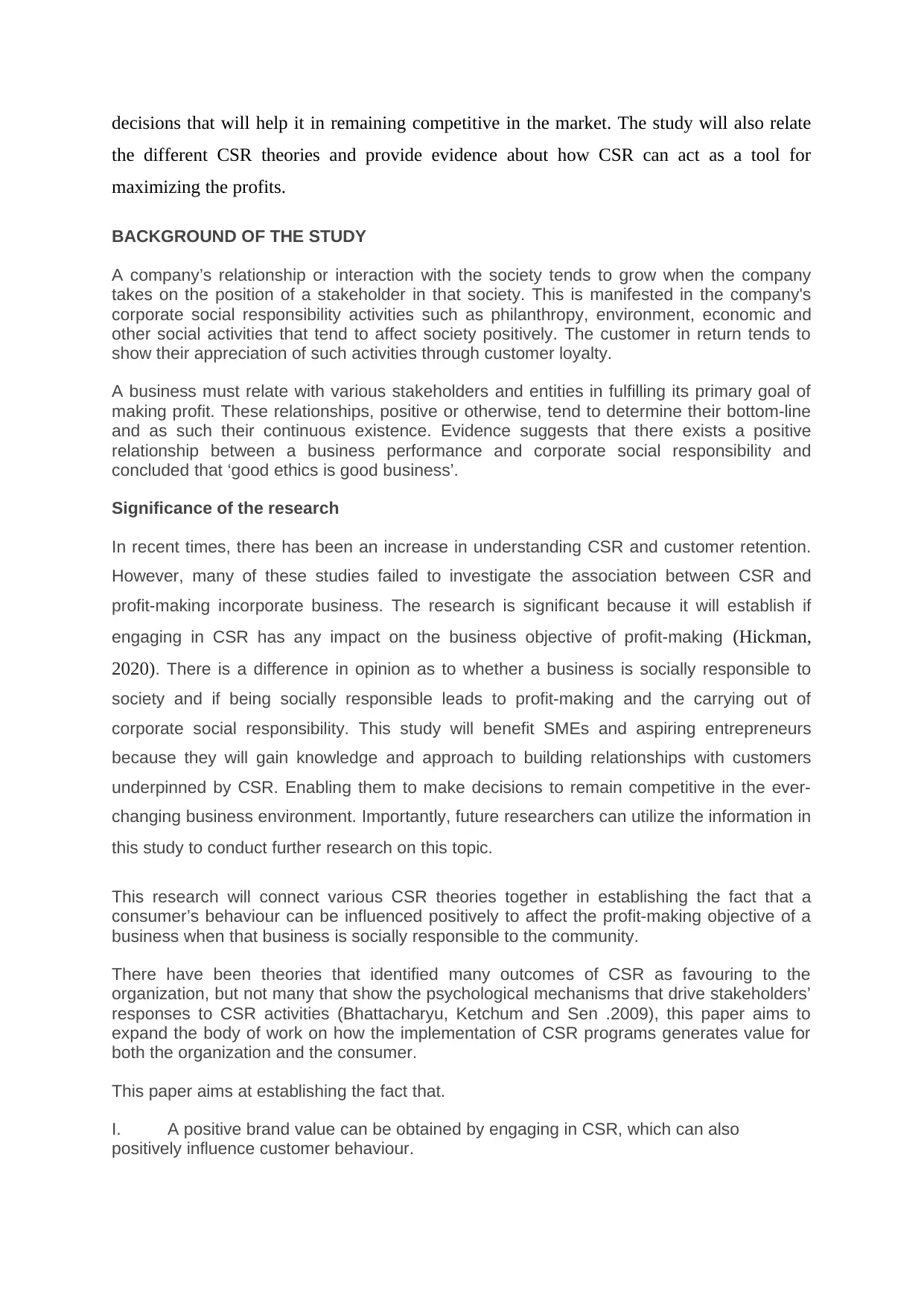
decisions that will help it in remaining competitive in the market. The study will also relate
the different CSR theories and provide evidence about how CSR can act as a tool for
maximizing the profits.
BACKGROUND OF THE STUDY
A company’s relationship or interaction with the society tends to grow when the company
takes on the position of a stakeholder in that society. This is manifested in the company's
corporate social responsibility activities such as philanthropy, environment, economic and
other social activities that tend to affect society positively. The customer in return tends to
show their appreciation of such activities through customer loyalty.
A business must relate with various stakeholders and entities in fulfilling its primary goal of
making profit. These relationships, positive or otherwise, tend to determine their bottom-line
and as such their continuous existence. Evidence suggests that there exists a positive
relationship between a business performance and corporate social responsibility and
concluded that ‘good ethics is good business’.
Significance of the research
In recent times, there has been an increase in understanding CSR and customer retention.
However, many of these studies failed to investigate the association between CSR and
profit-making incorporate business. The research is significant because it will establish if
engaging in CSR has any impact on the business objective of profit-making (Hickman,
2020). There is a difference in opinion as to whether a business is socially responsible to
society and if being socially responsible leads to profit-making and the carrying out of
corporate social responsibility. This study will benefit SMEs and aspiring entrepreneurs
because they will gain knowledge and approach to building relationships with customers
underpinned by CSR. Enabling them to make decisions to remain competitive in the ever-
changing business environment. Importantly, future researchers can utilize the information in
this study to conduct further research on this topic.
This research will connect various CSR theories together in establishing the fact that a
consumer’s behaviour can be influenced positively to affect the profit-making objective of a
business when that business is socially responsible to the community.
There have been theories that identified many outcomes of CSR as favouring to the
organization, but not many that show the psychological mechanisms that drive stakeholders’
responses to CSR activities (Bhattacharyu, Ketchum and Sen .2009), this paper aims to
expand the body of work on how the implementation of CSR programs generates value for
both the organization and the consumer.
This paper aims at establishing the fact that.
I. A positive brand value can be obtained by engaging in CSR, which can also
positively influence customer behaviour.
the different CSR theories and provide evidence about how CSR can act as a tool for
maximizing the profits.
BACKGROUND OF THE STUDY
A company’s relationship or interaction with the society tends to grow when the company
takes on the position of a stakeholder in that society. This is manifested in the company's
corporate social responsibility activities such as philanthropy, environment, economic and
other social activities that tend to affect society positively. The customer in return tends to
show their appreciation of such activities through customer loyalty.
A business must relate with various stakeholders and entities in fulfilling its primary goal of
making profit. These relationships, positive or otherwise, tend to determine their bottom-line
and as such their continuous existence. Evidence suggests that there exists a positive
relationship between a business performance and corporate social responsibility and
concluded that ‘good ethics is good business’.
Significance of the research
In recent times, there has been an increase in understanding CSR and customer retention.
However, many of these studies failed to investigate the association between CSR and
profit-making incorporate business. The research is significant because it will establish if
engaging in CSR has any impact on the business objective of profit-making (Hickman,
2020). There is a difference in opinion as to whether a business is socially responsible to
society and if being socially responsible leads to profit-making and the carrying out of
corporate social responsibility. This study will benefit SMEs and aspiring entrepreneurs
because they will gain knowledge and approach to building relationships with customers
underpinned by CSR. Enabling them to make decisions to remain competitive in the ever-
changing business environment. Importantly, future researchers can utilize the information in
this study to conduct further research on this topic.
This research will connect various CSR theories together in establishing the fact that a
consumer’s behaviour can be influenced positively to affect the profit-making objective of a
business when that business is socially responsible to the community.
There have been theories that identified many outcomes of CSR as favouring to the
organization, but not many that show the psychological mechanisms that drive stakeholders’
responses to CSR activities (Bhattacharyu, Ketchum and Sen .2009), this paper aims to
expand the body of work on how the implementation of CSR programs generates value for
both the organization and the consumer.
This paper aims at establishing the fact that.
I. A positive brand value can be obtained by engaging in CSR, which can also
positively influence customer behaviour.
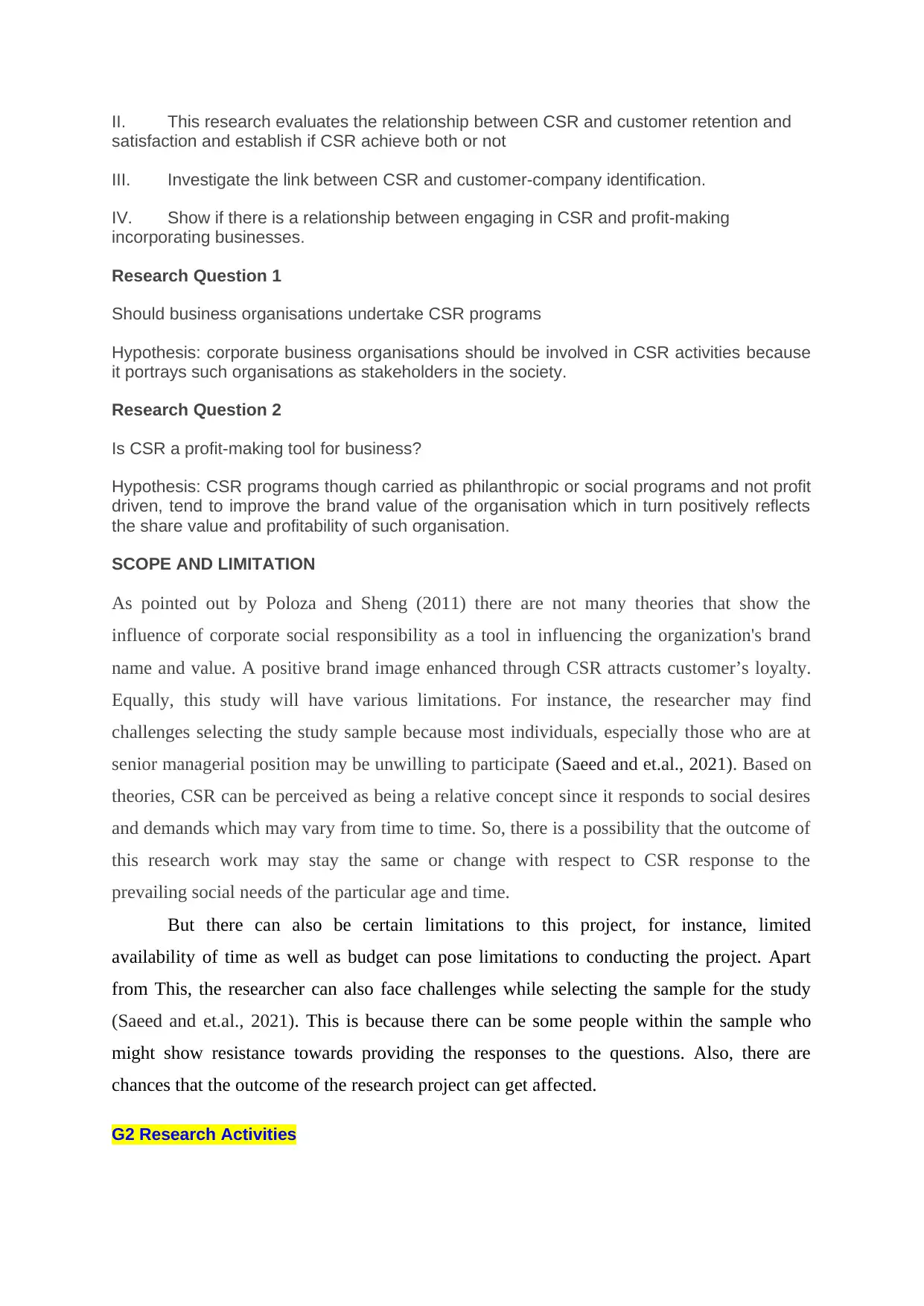
II. This research evaluates the relationship between CSR and customer retention and
satisfaction and establish if CSR achieve both or not
III. Investigate the link between CSR and customer-company identification.
IV. Show if there is a relationship between engaging in CSR and profit-making
incorporating businesses.
Research Question 1
Should business organisations undertake CSR programs
Hypothesis: corporate business organisations should be involved in CSR activities because
it portrays such organisations as stakeholders in the society.
Research Question 2
Is CSR a profit-making tool for business?
Hypothesis: CSR programs though carried as philanthropic or social programs and not profit
driven, tend to improve the brand value of the organisation which in turn positively reflects
the share value and profitability of such organisation.
SCOPE AND LIMITATION
As pointed out by Poloza and Sheng (2011) there are not many theories that show the
influence of corporate social responsibility as a tool in influencing the organization's brand
name and value. A positive brand image enhanced through CSR attracts customer’s loyalty.
Equally, this study will have various limitations. For instance, the researcher may find
challenges selecting the study sample because most individuals, especially those who are at
senior managerial position may be unwilling to participate (Saeed and et.al., 2021). Based on
theories, CSR can be perceived as being a relative concept since it responds to social desires
and demands which may vary from time to time. So, there is a possibility that the outcome of
this research work may stay the same or change with respect to CSR response to the
prevailing social needs of the particular age and time.
But there can also be certain limitations to this project, for instance, limited
availability of time as well as budget can pose limitations to conducting the project. Apart
from This, the researcher can also face challenges while selecting the sample for the study
(Saeed and et.al., 2021). This is because there can be some people within the sample who
might show resistance towards providing the responses to the questions. Also, there are
chances that the outcome of the research project can get affected.
G2 Research Activities
satisfaction and establish if CSR achieve both or not
III. Investigate the link between CSR and customer-company identification.
IV. Show if there is a relationship between engaging in CSR and profit-making
incorporating businesses.
Research Question 1
Should business organisations undertake CSR programs
Hypothesis: corporate business organisations should be involved in CSR activities because
it portrays such organisations as stakeholders in the society.
Research Question 2
Is CSR a profit-making tool for business?
Hypothesis: CSR programs though carried as philanthropic or social programs and not profit
driven, tend to improve the brand value of the organisation which in turn positively reflects
the share value and profitability of such organisation.
SCOPE AND LIMITATION
As pointed out by Poloza and Sheng (2011) there are not many theories that show the
influence of corporate social responsibility as a tool in influencing the organization's brand
name and value. A positive brand image enhanced through CSR attracts customer’s loyalty.
Equally, this study will have various limitations. For instance, the researcher may find
challenges selecting the study sample because most individuals, especially those who are at
senior managerial position may be unwilling to participate (Saeed and et.al., 2021). Based on
theories, CSR can be perceived as being a relative concept since it responds to social desires
and demands which may vary from time to time. So, there is a possibility that the outcome of
this research work may stay the same or change with respect to CSR response to the
prevailing social needs of the particular age and time.
But there can also be certain limitations to this project, for instance, limited
availability of time as well as budget can pose limitations to conducting the project. Apart
from This, the researcher can also face challenges while selecting the sample for the study
(Saeed and et.al., 2021). This is because there can be some people within the sample who
might show resistance towards providing the responses to the questions. Also, there are
chances that the outcome of the research project can get affected.
G2 Research Activities
⊘ This is a preview!⊘
Do you want full access?
Subscribe today to unlock all pages.

Trusted by 1+ million students worldwide
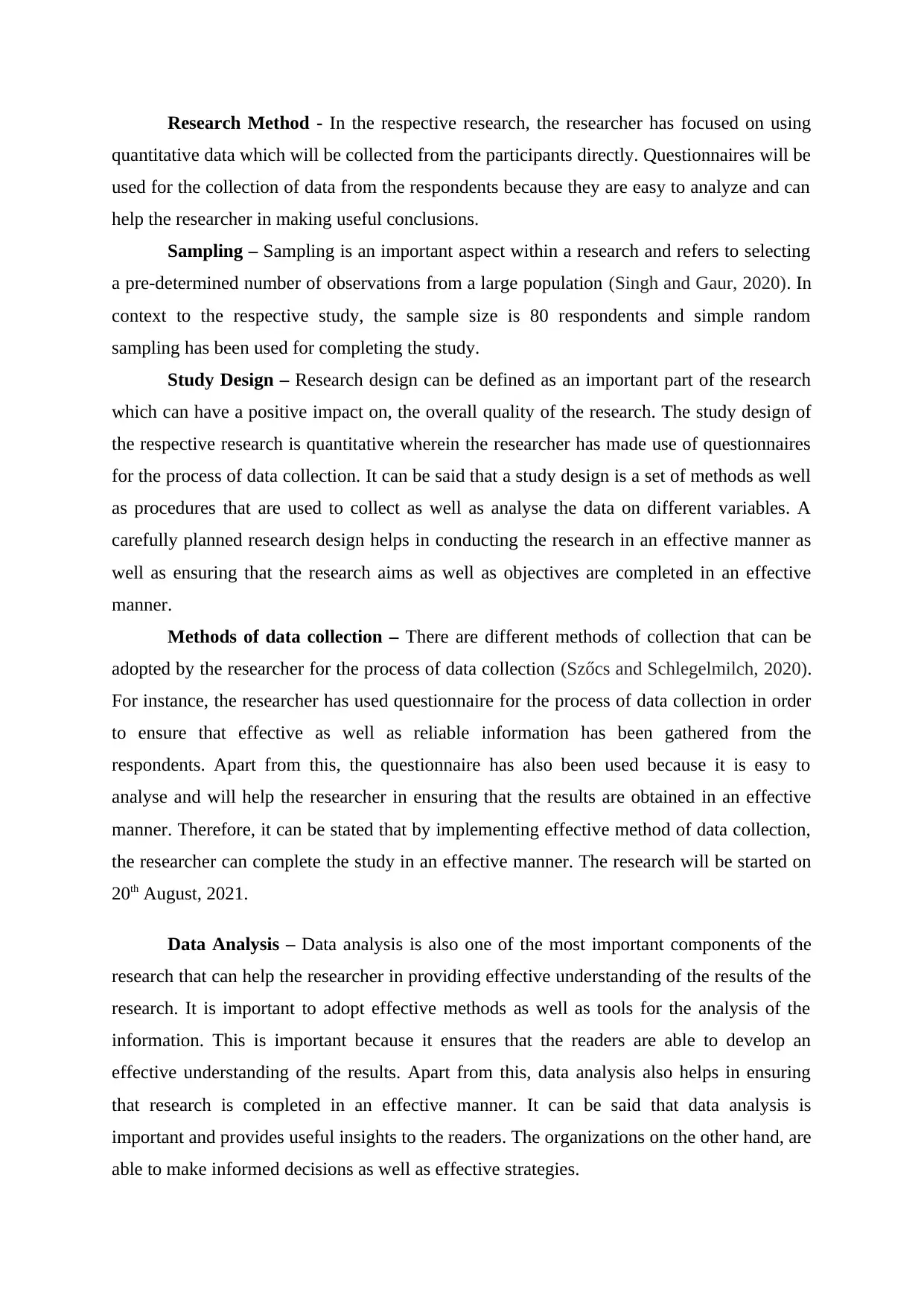
Research Method - In the respective research, the researcher has focused on using
quantitative data which will be collected from the participants directly. Questionnaires will be
used for the collection of data from the respondents because they are easy to analyze and can
help the researcher in making useful conclusions.
Sampling – Sampling is an important aspect within a research and refers to selecting
a pre-determined number of observations from a large population (Singh and Gaur, 2020). In
context to the respective study, the sample size is 80 respondents and simple random
sampling has been used for completing the study.
Study Design – Research design can be defined as an important part of the research
which can have a positive impact on, the overall quality of the research. The study design of
the respective research is quantitative wherein the researcher has made use of questionnaires
for the process of data collection. It can be said that a study design is a set of methods as well
as procedures that are used to collect as well as analyse the data on different variables. A
carefully planned research design helps in conducting the research in an effective manner as
well as ensuring that the research aims as well as objectives are completed in an effective
manner.
Methods of data collection – There are different methods of collection that can be
adopted by the researcher for the process of data collection (Szőcs and Schlegelmilch, 2020).
For instance, the researcher has used questionnaire for the process of data collection in order
to ensure that effective as well as reliable information has been gathered from the
respondents. Apart from this, the questionnaire has also been used because it is easy to
analyse and will help the researcher in ensuring that the results are obtained in an effective
manner. Therefore, it can be stated that by implementing effective method of data collection,
the researcher can complete the study in an effective manner. The research will be started on
20th August, 2021.
Data Analysis – Data analysis is also one of the most important components of the
research that can help the researcher in providing effective understanding of the results of the
research. It is important to adopt effective methods as well as tools for the analysis of the
information. This is important because it ensures that the readers are able to develop an
effective understanding of the results. Apart from this, data analysis also helps in ensuring
that research is completed in an effective manner. It can be said that data analysis is
important and provides useful insights to the readers. The organizations on the other hand, are
able to make informed decisions as well as effective strategies.
quantitative data which will be collected from the participants directly. Questionnaires will be
used for the collection of data from the respondents because they are easy to analyze and can
help the researcher in making useful conclusions.
Sampling – Sampling is an important aspect within a research and refers to selecting
a pre-determined number of observations from a large population (Singh and Gaur, 2020). In
context to the respective study, the sample size is 80 respondents and simple random
sampling has been used for completing the study.
Study Design – Research design can be defined as an important part of the research
which can have a positive impact on, the overall quality of the research. The study design of
the respective research is quantitative wherein the researcher has made use of questionnaires
for the process of data collection. It can be said that a study design is a set of methods as well
as procedures that are used to collect as well as analyse the data on different variables. A
carefully planned research design helps in conducting the research in an effective manner as
well as ensuring that the research aims as well as objectives are completed in an effective
manner.
Methods of data collection – There are different methods of collection that can be
adopted by the researcher for the process of data collection (Szőcs and Schlegelmilch, 2020).
For instance, the researcher has used questionnaire for the process of data collection in order
to ensure that effective as well as reliable information has been gathered from the
respondents. Apart from this, the questionnaire has also been used because it is easy to
analyse and will help the researcher in ensuring that the results are obtained in an effective
manner. Therefore, it can be stated that by implementing effective method of data collection,
the researcher can complete the study in an effective manner. The research will be started on
20th August, 2021.
Data Analysis – Data analysis is also one of the most important components of the
research that can help the researcher in providing effective understanding of the results of the
research. It is important to adopt effective methods as well as tools for the analysis of the
information. This is important because it ensures that the readers are able to develop an
effective understanding of the results. Apart from this, data analysis also helps in ensuring
that research is completed in an effective manner. It can be said that data analysis is
important and provides useful insights to the readers. The organizations on the other hand, are
able to make informed decisions as well as effective strategies.
Paraphrase This Document
Need a fresh take? Get an instant paraphrase of this document with our AI Paraphraser
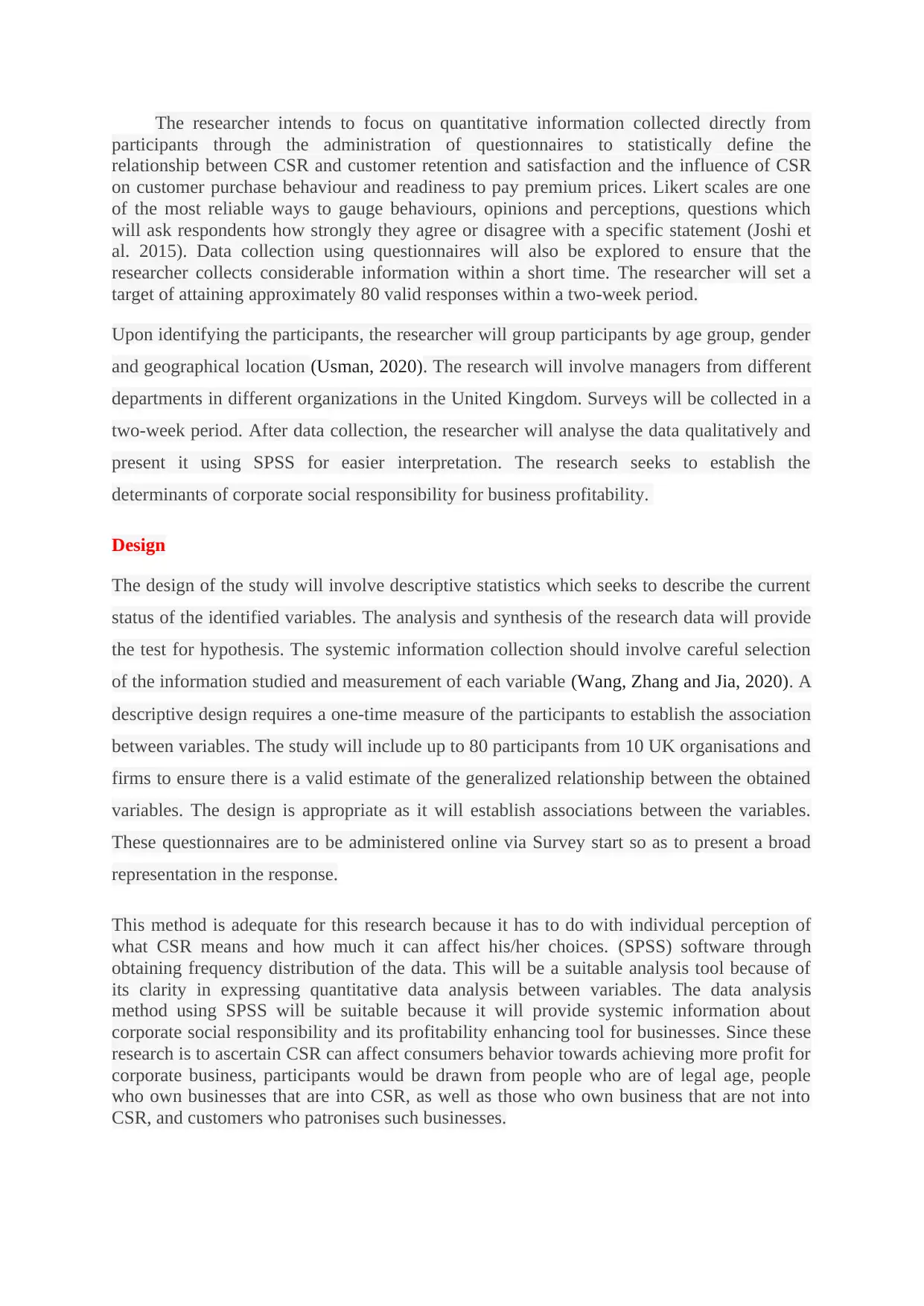
The researcher intends to focus on quantitative information collected directly from
participants through the administration of questionnaires to statistically define the
relationship between CSR and customer retention and satisfaction and the influence of CSR
on customer purchase behaviour and readiness to pay premium prices. Likert scales are one
of the most reliable ways to gauge behaviours, opinions and perceptions, questions which
will ask respondents how strongly they agree or disagree with a specific statement (Joshi et
al. 2015). Data collection using questionnaires will also be explored to ensure that the
researcher collects considerable information within a short time. The researcher will set a
target of attaining approximately 80 valid responses within a two-week period.
Upon identifying the participants, the researcher will group participants by age group, gender
and geographical location (Usman, 2020). The research will involve managers from different
departments in different organizations in the United Kingdom. Surveys will be collected in a
two-week period. After data collection, the researcher will analyse the data qualitatively and
present it using SPSS for easier interpretation. The research seeks to establish the
determinants of corporate social responsibility for business profitability.
Design
The design of the study will involve descriptive statistics which seeks to describe the current
status of the identified variables. The analysis and synthesis of the research data will provide
the test for hypothesis. The systemic information collection should involve careful selection
of the information studied and measurement of each variable (Wang, Zhang and Jia, 2020). A
descriptive design requires a one-time measure of the participants to establish the association
between variables. The study will include up to 80 participants from 10 UK organisations and
firms to ensure there is a valid estimate of the generalized relationship between the obtained
variables. The design is appropriate as it will establish associations between the variables.
These questionnaires are to be administered online via Survey start so as to present a broad
representation in the response.
This method is adequate for this research because it has to do with individual perception of
what CSR means and how much it can affect his/her choices. (SPSS) software through
obtaining frequency distribution of the data. This will be a suitable analysis tool because of
its clarity in expressing quantitative data analysis between variables. The data analysis
method using SPSS will be suitable because it will provide systemic information about
corporate social responsibility and its profitability enhancing tool for businesses. Since these
research is to ascertain CSR can affect consumers behavior towards achieving more profit for
corporate business, participants would be drawn from people who are of legal age, people
who own businesses that are into CSR, as well as those who own business that are not into
CSR, and customers who patronises such businesses.
participants through the administration of questionnaires to statistically define the
relationship between CSR and customer retention and satisfaction and the influence of CSR
on customer purchase behaviour and readiness to pay premium prices. Likert scales are one
of the most reliable ways to gauge behaviours, opinions and perceptions, questions which
will ask respondents how strongly they agree or disagree with a specific statement (Joshi et
al. 2015). Data collection using questionnaires will also be explored to ensure that the
researcher collects considerable information within a short time. The researcher will set a
target of attaining approximately 80 valid responses within a two-week period.
Upon identifying the participants, the researcher will group participants by age group, gender
and geographical location (Usman, 2020). The research will involve managers from different
departments in different organizations in the United Kingdom. Surveys will be collected in a
two-week period. After data collection, the researcher will analyse the data qualitatively and
present it using SPSS for easier interpretation. The research seeks to establish the
determinants of corporate social responsibility for business profitability.
Design
The design of the study will involve descriptive statistics which seeks to describe the current
status of the identified variables. The analysis and synthesis of the research data will provide
the test for hypothesis. The systemic information collection should involve careful selection
of the information studied and measurement of each variable (Wang, Zhang and Jia, 2020). A
descriptive design requires a one-time measure of the participants to establish the association
between variables. The study will include up to 80 participants from 10 UK organisations and
firms to ensure there is a valid estimate of the generalized relationship between the obtained
variables. The design is appropriate as it will establish associations between the variables.
These questionnaires are to be administered online via Survey start so as to present a broad
representation in the response.
This method is adequate for this research because it has to do with individual perception of
what CSR means and how much it can affect his/her choices. (SPSS) software through
obtaining frequency distribution of the data. This will be a suitable analysis tool because of
its clarity in expressing quantitative data analysis between variables. The data analysis
method using SPSS will be suitable because it will provide systemic information about
corporate social responsibility and its profitability enhancing tool for businesses. Since these
research is to ascertain CSR can affect consumers behavior towards achieving more profit for
corporate business, participants would be drawn from people who are of legal age, people
who own businesses that are into CSR, as well as those who own business that are not into
CSR, and customers who patronises such businesses.
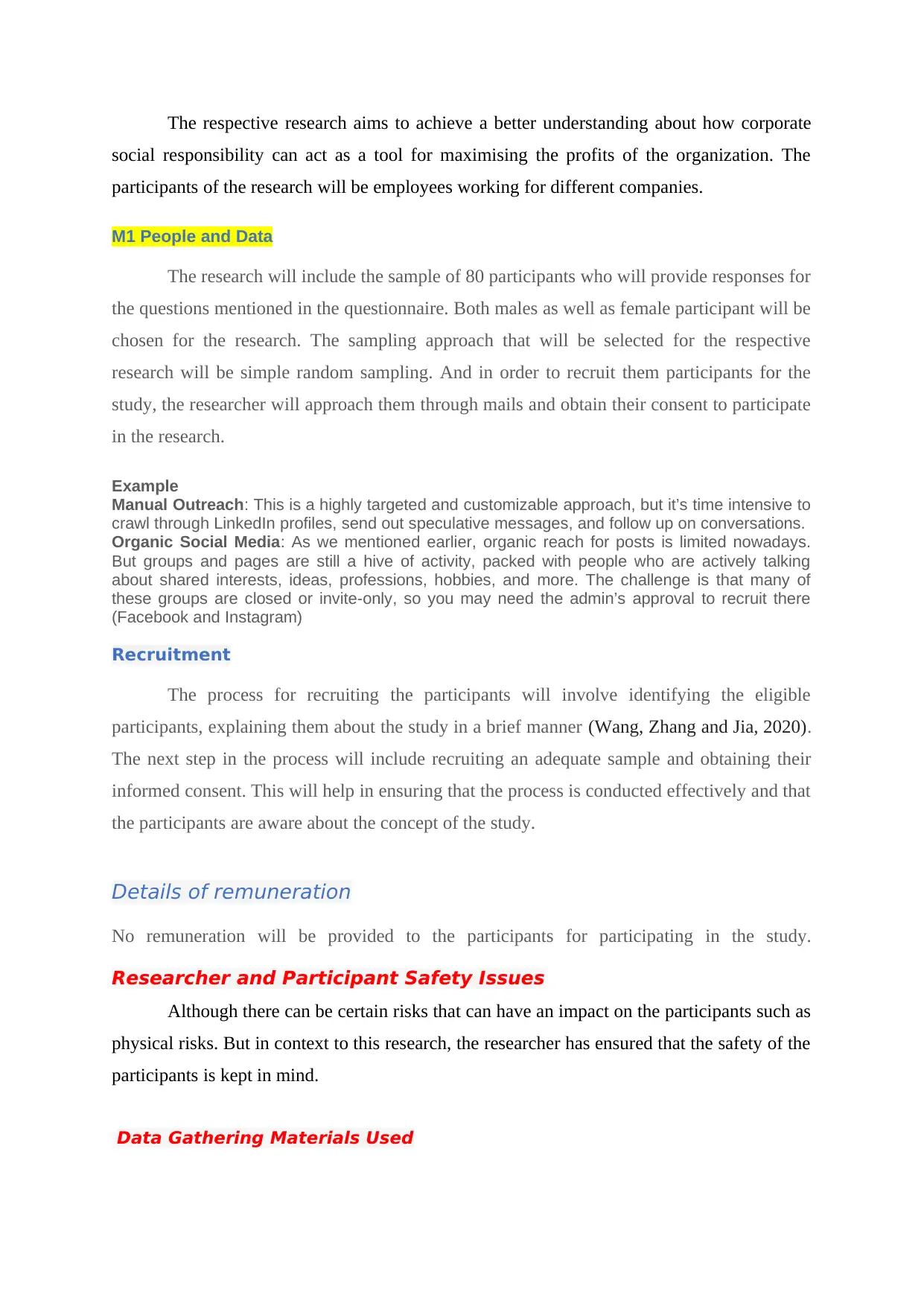
The respective research aims to achieve a better understanding about how corporate
social responsibility can act as a tool for maximising the profits of the organization. The
participants of the research will be employees working for different companies.
M1 People and Data
The research will include the sample of 80 participants who will provide responses for
the questions mentioned in the questionnaire. Both males as well as female participant will be
chosen for the research. The sampling approach that will be selected for the respective
research will be simple random sampling. And in order to recruit them participants for the
study, the researcher will approach them through mails and obtain their consent to participate
in the research.
Example
Manual Outreach: This is a highly targeted and customizable approach, but it’s time intensive to
crawl through LinkedIn profiles, send out speculative messages, and follow up on conversations.
Organic Social Media: As we mentioned earlier, organic reach for posts is limited nowadays.
But groups and pages are still a hive of activity, packed with people who are actively talking
about shared interests, ideas, professions, hobbies, and more. The challenge is that many of
these groups are closed or invite-only, so you may need the admin’s approval to recruit there
(Facebook and Instagram)
Recruitment
The process for recruiting the participants will involve identifying the eligible
participants, explaining them about the study in a brief manner (Wang, Zhang and Jia, 2020).
The next step in the process will include recruiting an adequate sample and obtaining their
informed consent. This will help in ensuring that the process is conducted effectively and that
the participants are aware about the concept of the study.
Details of remuneration
No remuneration will be provided to the participants for participating in the study.
Researcher and Participant Safety Issues
Although there can be certain risks that can have an impact on the participants such as
physical risks. But in context to this research, the researcher has ensured that the safety of the
participants is kept in mind.
Data Gathering Materials Used
social responsibility can act as a tool for maximising the profits of the organization. The
participants of the research will be employees working for different companies.
M1 People and Data
The research will include the sample of 80 participants who will provide responses for
the questions mentioned in the questionnaire. Both males as well as female participant will be
chosen for the research. The sampling approach that will be selected for the respective
research will be simple random sampling. And in order to recruit them participants for the
study, the researcher will approach them through mails and obtain their consent to participate
in the research.
Example
Manual Outreach: This is a highly targeted and customizable approach, but it’s time intensive to
crawl through LinkedIn profiles, send out speculative messages, and follow up on conversations.
Organic Social Media: As we mentioned earlier, organic reach for posts is limited nowadays.
But groups and pages are still a hive of activity, packed with people who are actively talking
about shared interests, ideas, professions, hobbies, and more. The challenge is that many of
these groups are closed or invite-only, so you may need the admin’s approval to recruit there
(Facebook and Instagram)
Recruitment
The process for recruiting the participants will involve identifying the eligible
participants, explaining them about the study in a brief manner (Wang, Zhang and Jia, 2020).
The next step in the process will include recruiting an adequate sample and obtaining their
informed consent. This will help in ensuring that the process is conducted effectively and that
the participants are aware about the concept of the study.
Details of remuneration
No remuneration will be provided to the participants for participating in the study.
Researcher and Participant Safety Issues
Although there can be certain risks that can have an impact on the participants such as
physical risks. But in context to this research, the researcher has ensured that the safety of the
participants is kept in mind.
Data Gathering Materials Used
⊘ This is a preview!⊘
Do you want full access?
Subscribe today to unlock all pages.

Trusted by 1+ million students worldwide
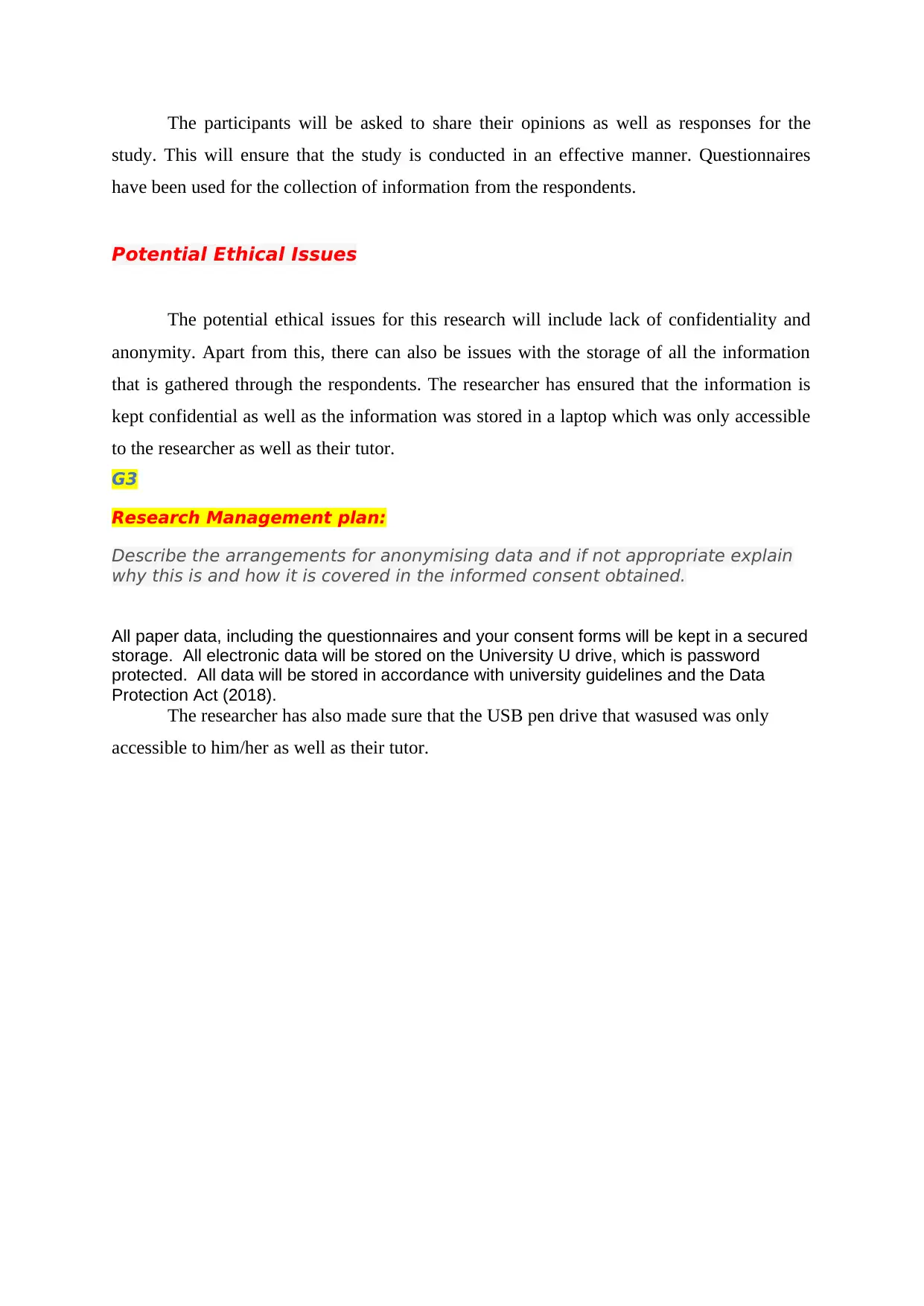
The participants will be asked to share their opinions as well as responses for the
study. This will ensure that the study is conducted in an effective manner. Questionnaires
have been used for the collection of information from the respondents.
Potential Ethical Issues
The potential ethical issues for this research will include lack of confidentiality and
anonymity. Apart from this, there can also be issues with the storage of all the information
that is gathered through the respondents. The researcher has ensured that the information is
kept confidential as well as the information was stored in a laptop which was only accessible
to the researcher as well as their tutor.
G3
Research Management plan:
Describe the arrangements for anonymising data and if not appropriate explain
why this is and how it is covered in the informed consent obtained.
All paper data, including the questionnaires and your consent forms will be kept in a secured
storage. All electronic data will be stored on the University U drive, which is password
protected. All data will be stored in accordance with university guidelines and the Data
Protection Act (2018).
The researcher has also made sure that the USB pen drive that wasused was only
accessible to him/her as well as their tutor.
study. This will ensure that the study is conducted in an effective manner. Questionnaires
have been used for the collection of information from the respondents.
Potential Ethical Issues
The potential ethical issues for this research will include lack of confidentiality and
anonymity. Apart from this, there can also be issues with the storage of all the information
that is gathered through the respondents. The researcher has ensured that the information is
kept confidential as well as the information was stored in a laptop which was only accessible
to the researcher as well as their tutor.
G3
Research Management plan:
Describe the arrangements for anonymising data and if not appropriate explain
why this is and how it is covered in the informed consent obtained.
All paper data, including the questionnaires and your consent forms will be kept in a secured
storage. All electronic data will be stored on the University U drive, which is password
protected. All data will be stored in accordance with university guidelines and the Data
Protection Act (2018).
The researcher has also made sure that the USB pen drive that wasused was only
accessible to him/her as well as their tutor.
Paraphrase This Document
Need a fresh take? Get an instant paraphrase of this document with our AI Paraphraser
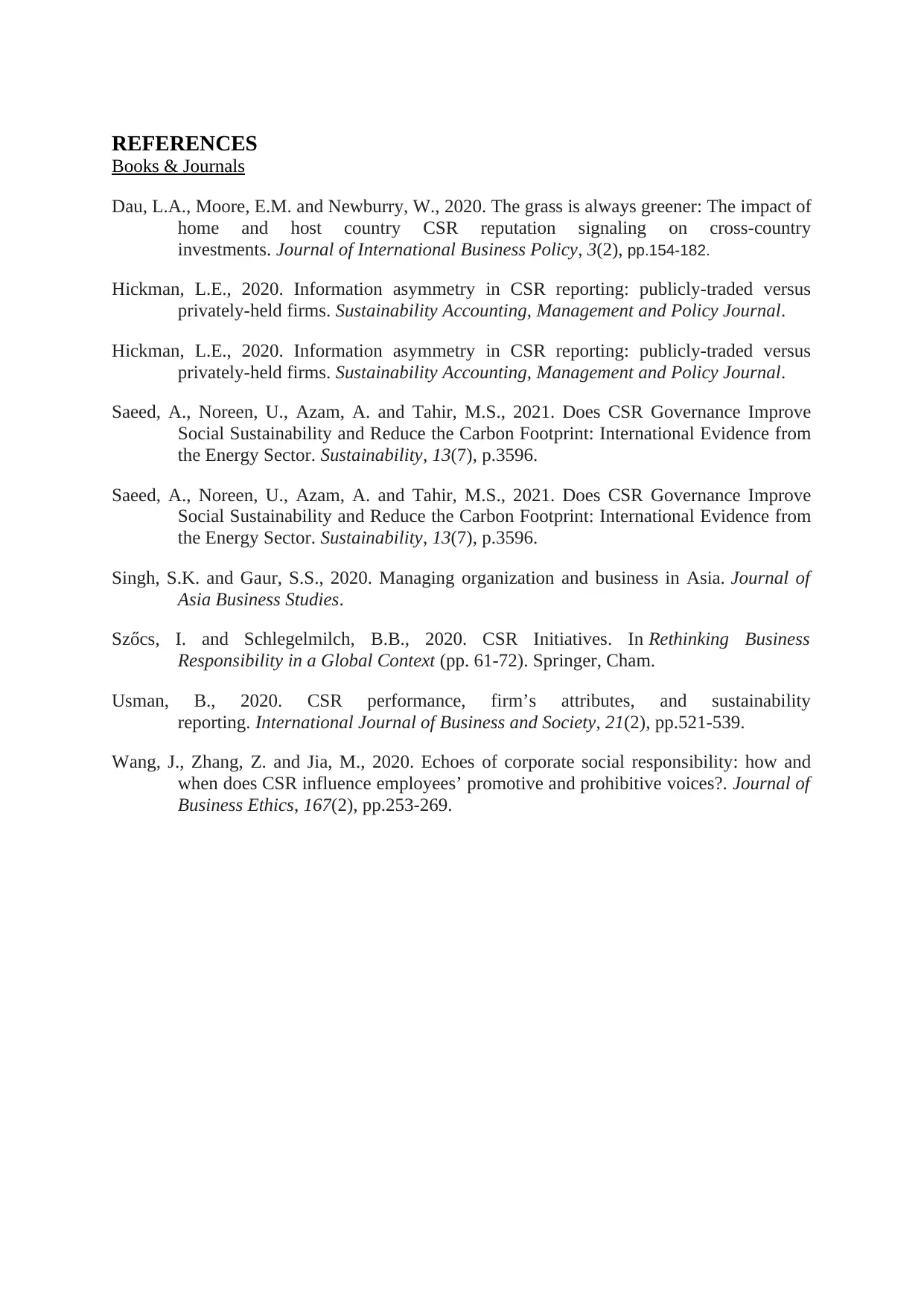
REFERENCES
Books & Journals
Dau, L.A., Moore, E.M. and Newburry, W., 2020. The grass is always greener: The impact of
home and host country CSR reputation signaling on cross-country
investments. Journal of International Business Policy, 3(2), pp.154-182.
Hickman, L.E., 2020. Information asymmetry in CSR reporting: publicly-traded versus
privately-held firms. Sustainability Accounting, Management and Policy Journal.
Hickman, L.E., 2020. Information asymmetry in CSR reporting: publicly-traded versus
privately-held firms. Sustainability Accounting, Management and Policy Journal.
Saeed, A., Noreen, U., Azam, A. and Tahir, M.S., 2021. Does CSR Governance Improve
Social Sustainability and Reduce the Carbon Footprint: International Evidence from
the Energy Sector. Sustainability, 13(7), p.3596.
Saeed, A., Noreen, U., Azam, A. and Tahir, M.S., 2021. Does CSR Governance Improve
Social Sustainability and Reduce the Carbon Footprint: International Evidence from
the Energy Sector. Sustainability, 13(7), p.3596.
Singh, S.K. and Gaur, S.S., 2020. Managing organization and business in Asia. Journal of
Asia Business Studies.
Szőcs, I. and Schlegelmilch, B.B., 2020. CSR Initiatives. In Rethinking Business
Responsibility in a Global Context (pp. 61-72). Springer, Cham.
Usman, B., 2020. CSR performance, firm’s attributes, and sustainability
reporting. International Journal of Business and Society, 21(2), pp.521-539.
Wang, J., Zhang, Z. and Jia, M., 2020. Echoes of corporate social responsibility: how and
when does CSR influence employees’ promotive and prohibitive voices?. Journal of
Business Ethics, 167(2), pp.253-269.
Books & Journals
Dau, L.A., Moore, E.M. and Newburry, W., 2020. The grass is always greener: The impact of
home and host country CSR reputation signaling on cross-country
investments. Journal of International Business Policy, 3(2), pp.154-182.
Hickman, L.E., 2020. Information asymmetry in CSR reporting: publicly-traded versus
privately-held firms. Sustainability Accounting, Management and Policy Journal.
Hickman, L.E., 2020. Information asymmetry in CSR reporting: publicly-traded versus
privately-held firms. Sustainability Accounting, Management and Policy Journal.
Saeed, A., Noreen, U., Azam, A. and Tahir, M.S., 2021. Does CSR Governance Improve
Social Sustainability and Reduce the Carbon Footprint: International Evidence from
the Energy Sector. Sustainability, 13(7), p.3596.
Saeed, A., Noreen, U., Azam, A. and Tahir, M.S., 2021. Does CSR Governance Improve
Social Sustainability and Reduce the Carbon Footprint: International Evidence from
the Energy Sector. Sustainability, 13(7), p.3596.
Singh, S.K. and Gaur, S.S., 2020. Managing organization and business in Asia. Journal of
Asia Business Studies.
Szőcs, I. and Schlegelmilch, B.B., 2020. CSR Initiatives. In Rethinking Business
Responsibility in a Global Context (pp. 61-72). Springer, Cham.
Usman, B., 2020. CSR performance, firm’s attributes, and sustainability
reporting. International Journal of Business and Society, 21(2), pp.521-539.
Wang, J., Zhang, Z. and Jia, M., 2020. Echoes of corporate social responsibility: how and
when does CSR influence employees’ promotive and prohibitive voices?. Journal of
Business Ethics, 167(2), pp.253-269.
1 out of 8
Related Documents
Your All-in-One AI-Powered Toolkit for Academic Success.
+13062052269
info@desklib.com
Available 24*7 on WhatsApp / Email
![[object Object]](/_next/static/media/star-bottom.7253800d.svg)
Unlock your academic potential
Copyright © 2020–2026 A2Z Services. All Rights Reserved. Developed and managed by ZUCOL.





